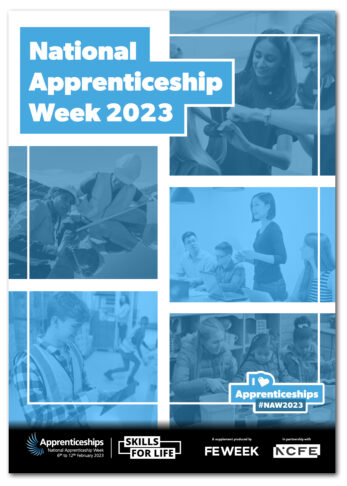There is the will, and the ideas, to do things differently
Shane Chowen, editor
Welcome to FE Week’s special supplement marking this year’s National Apprenticeship Week.
What’s great about putting together a publication like this is the palpable determination by everybody to make apprenticeships a success. As Jennifer Coupland, CEO of the Institute for Apprenticeships and Technical Education writes in her piece, there is undoubtedly a shift happening in education policy towards wanting more and better apprenticeship opportunities.
Throughout these pages you’ll see a range of views on what the short and long term priorities should be to achieve that growth in participation and improvements in apprenticeship experience. This publication comes just one month ahead of the Budget and the first set of achievement rates data we’ve seen since before the pandemic, so debates on funding and quality will inevitably dominate the pages of FE Week in the weeks and months to come.
Chiefs of two of the sector’s leading representative organisations have penned a joint piece looking at functional skills on page 15. They make the case that the current requirements on apprentices is one of the factors leading to the high apprentice drop-out rate and offer some suggestions on how a better use of technology in initial assessment can deliver better outcomes for learners.
Since his return as the minister responsible for apprenticeships, Robert Halfon has been banging the drum, or rather, hanging his ladder of opportunity, on the role of apprenticeships in social justice. His ambition is widely known and widely respected in the sector. He gives an honest account of this when challenged by FE Week’s deputy editor Billy Camden with evidence that suggests, at degree level, apprenticeships are more socially exclusive than traditional university entry. You can read Billy’s full interview on pages 5 and 6.
Of course funding is never far away from the debate. While there’s been some welcome news this year on “exceptional” funding uplifts for some standards, there’s still debate about utilisation of the apprenticeship levy. Shadow minister Toby Perkins makes the Labour Party’s case on page 7 for a broader skills and growth levy and Kirsti Donnelly talks about City and Guilds’ latest research with employers on page 24.
This time last year saw the launch of flexi-job apprenticeships. FE Week reported Tallulah Taylor spoke to some employers, apprentices and new flexi-job apprenticeship agencies to see how the programme is playing out. Tallulah finds some unexpected benefits to the scheme but reports that a lack of commitment from the government could halt further expansion. And all of this has to fit in the wider economic context facing our country. Apprenticeships are in a uniquely vulnerable position in the education system as employers battle rising costs and competing priorities. But, as these pages show, there is not only the will but also the ideas in the sector to do things differently.















